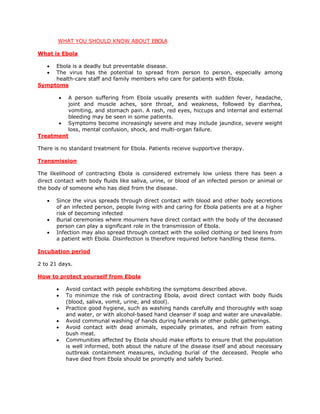
What you should know about Ebola
- 1. WHAT YOU SHOULD KNOW ABOUT EBOLA What is Ebola • Ebola is a deadly but preventable disease. • The virus has the potential to spread from person to person, especially among health-care staff and family members who care for patients with Ebola. Symptoms •A person suffering from Ebola usually presents with sudden fever, headache, joint and muscle aches, sore throat, and weakness, followed by diarrhea, vomiting, and stomach pain. A rash, red eyes, hiccups and internal and external bleeding may be seen in some patients. • Symptoms become increasingly severe and may include jaundice, severe weight loss, mental confusion, shock, and multi-organ failure. Treatment There is no standard treatment for Ebola. Patients receive supportive therapy. Transmission The likelihood of contracting Ebola is considered extremely low unless there has been a direct contact with body fluids like saliva, urine, or blood of an infected person or animal or the body of someone who has died from the disease. • Since the virus spreads through direct contact with blood and other body secretions of an infected person, people living with and caring for Ebola patients are at a higher risk of becoming infected • Burial ceremonies where mourners have direct contact with the body of the deceased person can play a significant role in the transmission of Ebola. • Infection may also spread through contact with the soiled clothing or bed linens from a patient with Ebola. Disinfection is therefore required before handling these items. Incubation period 2 to 21 days. How to protect yourself from Ebola • Avoid contact with people exhibiting the symptoms described above. • To minimize the risk of contracting Ebola, avoid direct contact with body fluids (blood, saliva, vomit, urine, and stool). • Practice good hygiene, such as washing hands carefully and thoroughly with soap and water, or with alcohol-based hand cleanser if soap and water are unavailable. • Avoid communal washing of hands during funerals or other public gatherings. • Avoid contact with dead animals, especially primates, and refrain from eating bush meat. • Communities affected by Ebola should make efforts to ensure that the population is well informed, both about the nature of the disease itself and about necessary outbreak containment measures, including burial of the deceased. People who have died from Ebola should be promptly and safely buried.
- 2. Ministry of Health (MOH) “Experts to handle Ebola are at Kagadi Hospital so there is no need referring any patient to Mulago or other hospital” (Director General of Health services) The CDC has additional information on protecting yourself from Ebola viral haemorrhagic fever available at the following websites. You are encouraged to read this information: Main resource: http://www.cdc.gov/ncidod/dvrd/spb/mnpages/dispages/ebola.htm Additional information: http://www.cdc.gov/ncidod/dvrd/spb/mnpages/dispages/ebola/qa.htm Dr. William Katamba
